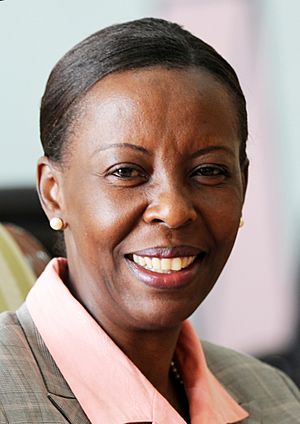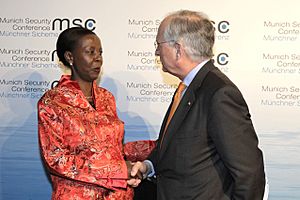Louise Mushikiwabo facts for kids
Quick facts for kids
Louise Mushikiwabo
|
|
|---|---|

Mushikiwabo in 2008
|
|
| 4th Secretary-General of the Organisation Internationale de la Francophonie | |
| Assumed office 3 January 2019 |
|
| Preceded by | Michaëlle Jean |
| Minister of Foreign Affairs | |
| In office 4 December 2009 – 18 October 2018 |
|
| President | Paul Kagame |
| Preceded by | Rosemary Museminali |
| Succeeded by | Richard Sezibera |
| Personal details | |
| Born | 22 May 1961 Kigali, Ruanda-Urundi |
| Political party | Independent |
| Education | University of Rwanda (BA) University of Delaware (MA) |
Louise Mushikiwabo (born May 22, 1961) is an important leader from Rwanda. She is currently the Secretary General of the Organisation internationale de la Francophonie, which is a group of countries that share the French language and culture. She started this role in 2019 and was re-elected in 2022. Before this, she was Rwanda's Minister of Foreign Affairs and Cooperation from 2009 to 2018. She also served as the government's spokesperson and Minister of Information.
Contents
Early Life and Education
Louise Mushikiwabo was born on May 22, 1961, in Kigali, the capital city of Rwanda. Her father, Bitsindinkumi, was a farmer and also worked as a bookkeeper for a coffee farm. Her mother, Nyiratulira, was related to a famous Rwandan historian. Louise was the youngest of nine children. Her brother, Lando Ndasingwa, was a well-known businessman and politician who died in 1994 during the Rwandan genocide. Her sister, Anne-Marie Kantengwa, later managed their brother's hotel and served in the Rwandan Parliament.
After finishing school in Kigali, Mushikiwabo studied at the National University of Rwanda (now called the University of Rwanda) from 1981 to 1984. She earned a bachelor's degree in English and worked briefly as a teacher. In 1986, she moved to the United States to study for a master's degree in Languages and Interpretation at the University of Delaware, focusing on French.
After finishing her studies in 1988, she stayed in the Washington, D.C. area. She started her career working for groups that try to influence government decisions. Later, she joined the African Development Bank (ADB), where she eventually became the Communications Director. She even lived in Tunisia for a short time as part of her job with the bank.
In 2006, Mushikiwabo wrote a book called Rwanda Means the Universe with American journalist Jack Kramer. The book tells her family's story, her early life in Rwanda, and her experiences after moving to the United States. It also talks about the Rwandan genocide and how it affected her family, as many of them were killed.
Political Career
Minister of Information (2008–2009)
In March 2008, Rwandan President Paul Kagame invited Louise Mushikiwabo to return to Rwanda and join his government. She became the Minister of Information. In this role, she had to make decisions about local media. For example, one newspaper had published articles comparing the president to Adolf Hitler. While she encouraged freedom of the press, she also made sure that the media followed Rwanda's laws about denying the genocide.
In 2009, she temporarily stopped the British Broadcasting Corporation (BBC) from broadcasting its Kinyarwanda radio station. She said it was because the programs were giving a platform to people who denied the genocide. The BBC disagreed, saying they had different understandings of the genocide.
As Minister of Information, Mushikiwabo also acted as the government's spokesperson. When Rwanda had a diplomatic issue with Germany, she spoke to international news outlets to explain Rwanda's side. She was able to give statements in Kinyarwanda, French, and English, which are all official languages of Rwanda.
Other Important Roles
Louise Mushikiwabo is involved in several other important groups:
- She is a member of the High-Level Group of Personalities on Africa-Europe Relations for the Africa Europe Foundation (since 2020).
- She is on the Advisory Council for the Munich Security Conference.
- She is a member of the International Gender Champions (IGC), which promotes gender equality.
- She is part of the Strategic Committee for the Paris School of International Affairs (PSIA).
Personal Life and Family
Louise Mushikiwabo's brother, Lando Ndasingwa, was the only Tutsi minister in the last government of Juvénal Habyarimana. He died at the start of the 1994 genocide. Her sister, Anne-Marie Kantengwa, took over their brother's hotel and restaurant, Chez Lando, after his death. Mushikiwabo is also the niece of the respected Rwandan scholar and priest Alexis Kagame.
See also
 In Spanish: Louise Mushikiwabo para niños
In Spanish: Louise Mushikiwabo para niños
- Cabinet of Rwanda
 | Claudette Colvin |
 | Myrlie Evers-Williams |
 | Alberta Odell Jones |


